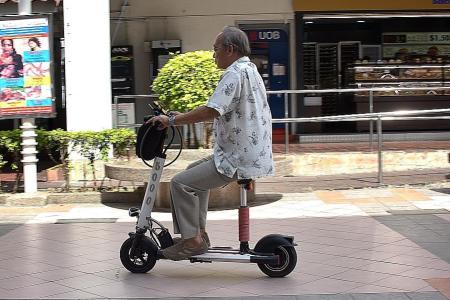When being mobile means quality of life
More elderly using mobility scooters in recent years
In his two years of using a mobility scooter, Mr Goh Lam Chie, 61, has had "five to six" unpleasant encounters with strangers.
"A man on the bus said I was pretending to need a scooter and taunted me," the former petrol station attendant told The New Paper in Mandarin last week.
Passengers alerted the bus driver, who knew Mr Goh, and he told the man to get off the bus.
Such issues, as well as accessibility of infrastructure, need addressing with the rise in elderly people using mobility scooters in recent years.
Retailers said mobility scooters, classified as personal mobility aids together with motorised wheelchairs, are now cheaper and more readily available.
Ten years ago, Falcon Mobility used to sell two to three units a month at about $3,000 each. Now it can sell 10 to 15 times more scooters at half the price.
Its general manager, Mr Warren Chew, said that in comparison, personal mobility devices such as e-scooters have become less popular because of tougher enforcement and high incidences of battery fires.
He added that mobility scooters have safety features such as a speed limit of 10kmh and automatic braking functions.
The Golden Concepts, which has been selling mobility scooters since 2013, estimated a 20 to 30 per cent year-on-year growth of these devices.
Co-founder Vanessa Keng said most users are elderly persons who want to remain independent and have mild to moderate mobility impairment.
A spokesman for Agis Mobility said the Seniors' Mobility and Enabling Fund, which can offer up to 90 per cent subsidy for the cost of mobility aids, has also contributed to their increasing numbers.
Former hawker Tan Yang Kin, whose right leg was amputated at the knee due to diabetes, said a mobility scooter has helped him become more independent.
"I can now also visit the doctor without having to trouble my children," said Mr Tan, 63, who uses his scooter every day.
Mr Jason Peh, an occupational therapist at Khoo Teck Puat Hospital, noted an increase in patients being referred to his clinic for training to use such mobility aids.
Infrastructure, such as better accessibility to public facilities and transport for such devices has also improved, he said.
Associate Professor Thang Leng Leng from the National University of Singapore, said the elderly see mobility as very important to their quality of life.
"It allows them to connect with their social network, preventing isolation, and improving their sense of well-being," she said.
Burdened by worn-out knee caps, former massage therapist Chia Tiong Nio, 60, has relied on a mobility scooter for five years.
She said: "I won't hold it against someone who doesn't understand how it feels like (to have to use a scooter every day)... these are things you have to take in your stride."
Get The New Paper on your phone with the free TNP app. Download from the Apple App Store or Google Play Store now



